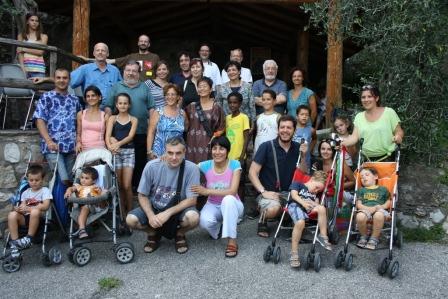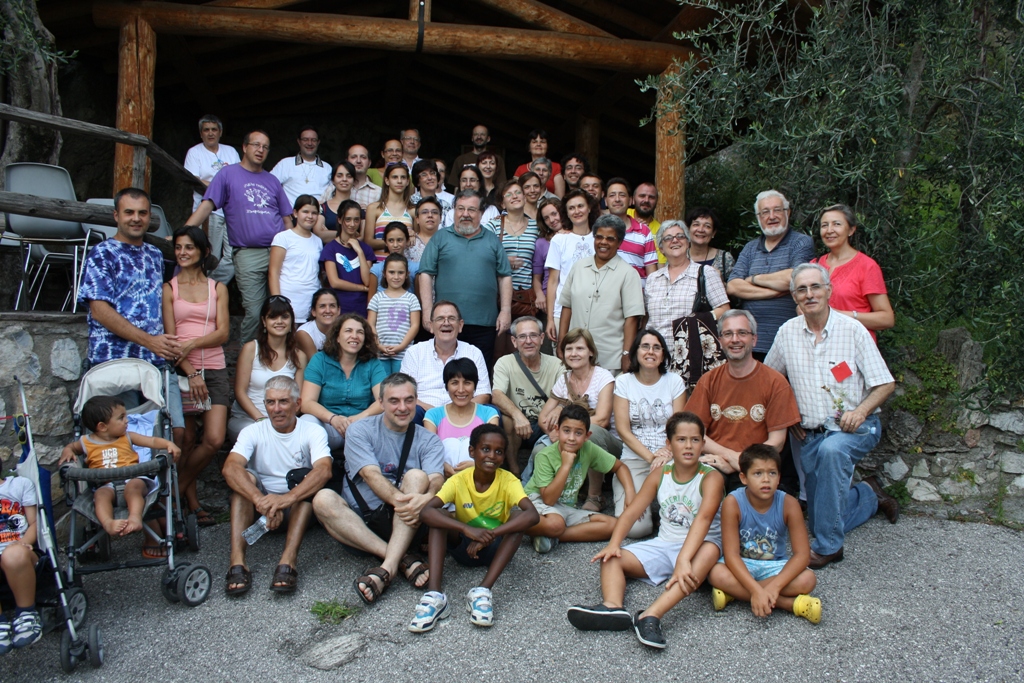Daniel Comboni
Comboni Missionaries
Institutional area
Other links
Newsletter
Rome, Thursday October 11, 2012
Samuele Gallazzi, Italian, reflects over what was discussed during the five days (August 2-7) of the second gathering of the CLM in Verona, where convened more than 60 participants from five European countries. “Among the many, I would like to dwell on one theme – says Gallazzi – that enkindled the spirits of the Italians: can we call ourselves CLM even if we have never had a lasting experience of mission?” This was one of the hot topics over the identity of the CLM that should by now be clarified before the 5th Assembly of CLM due to take place in Maia, Portugal, on December 2-9 2012.

Italians Comboni Lay Missionaries.
In the splendid panorama of Verona, the gathering of the CLM was certainly a time of intense debate, especially for those – such as the clamoring and numerous Italian delegation – was present at this type of meeting for the first time. The guests were expert and stimulated the group with a series of observations, each deserving of a more adequate in depth study. Among the many, I would like to dwell on a theme that enkindled the spirits of the Italians: can we call ourselves CLM even without having had a lasting experience of mission? I know: the theme is old and at time monotonous, but opening it in an international forum – even though it has no longer any life in Italy – could open new ways of interpretation.
It seems in fact that in Europe the question is not a daily concern, nor does it increase the tension of the relations between the CLM and the Comboni Institute. Having been asked, the delegate of the Central Commission of the CLM, Alberto de la Portilla, answered serenely: no, without mission experience one is not a CLM. Not satisfied with his answer I looked through the documents of the CLM (Granada 2006 - Firenze 2007) and even there I find the same lack of attention towards the theme which disposed of briefly by saying that the CLM is the one who goes, who has gone or who is about to go.
Therefore, the question at the international level has been long clarified and only in Italy there are difficulties in accepting it. Alberto explained better his answer: the CLM are not and do not intend to be the only lay answer within the Comboni world; in Spain for instance many sympathizers who support those who go are members of an ONLUS, Amani. Hence Alberto’s conclusion: why the need to call everyone CLM?
I think that this legitimate question can be observed with three orders of motivations.
The first. The lay Comboni reality in Italy is made up by a series of groups, mostly born in the vicinity of Comboni houses, with different origins, ages and dimensions, but all pushing in the same direction: to promote the Comboni activity, make it live and grow with the understanding that the message of Comboni is a vocation even for us, here, today. These are groups who live within their territory their lay inspiration as related to Comboni, proposing different journeys of formation, commitment and mission. The presence of these groups is an enrichment with great potentials:
- The groups are catalysts for the young – and others – who have the desire to continue to deepen the Comboni charism eve after having done the journey of getting to know the Comboni world (GIM); in this sense they are the most effective form of “recruiting” new members of the CLM;
- Various groups have created – or are creating – residential communities of families, an important point of the activity of the CLM in Italy: these communities are like training ground for those who will go to live an experience of community life and making it easier for the families that return from the missions offering them housing for the first few months after they come back;
- Finally, there is a national coordination that unites the activities of the various groups operating on the territory.
The other European nations present in Verona do not have – in as much as I could understand in the confusion of languages of those days – the same texture of groups spread over the national territory, but the individuals belonging to the CLM get together in national gatherings that, naturally are less frequent than those who are closer geographically.
The second reason can be summarized in one question: Why even today do we limit mission to the dimension “ad extra”? The reflection on mission points always more to an anthropological vision of mission and always less to a purely geographical aspect. To do mission in Europe today not only is no longer an oxymoron, but becomes always more a necessity over which all the missionary institutes must reflect and find concrete answers. We must get away from the stereotype which sees the missionary in his own country as simply “parked”, and develop the increasing needs that Italy and Europe place in relation to the Least. If this is true for the priests and for the sisters, even more it should be for lay people, who could become enlightened precursors on this path.
The third and last aspect is born of the consideration that to divide the Comboni lay reality in those who go and those who don’t would run the risk of creating groups and sub-groups, without putting together intelligences and energies. Who would gain from such separation? It is better to stick together in order to have a lay movement which is strong and credible, tied together not simply by having lived and important experience abroad but for having chosen Comboni as a way to live one’s belonging to the Church: to be CLM must be first of all a vocation to which we feel we are called.
In conclusion, I hope that this our Italian “heresy” may give rise to a European debate within the movement of the CLM, which will lead us to dialog over these and other considerations of living our mission.
Samuele Gallazzi
CLM – Venegono/Italy




